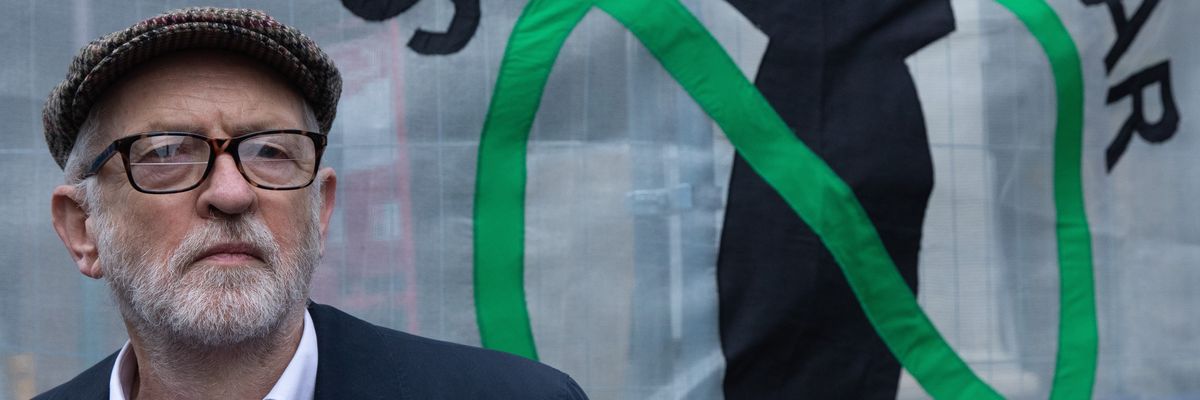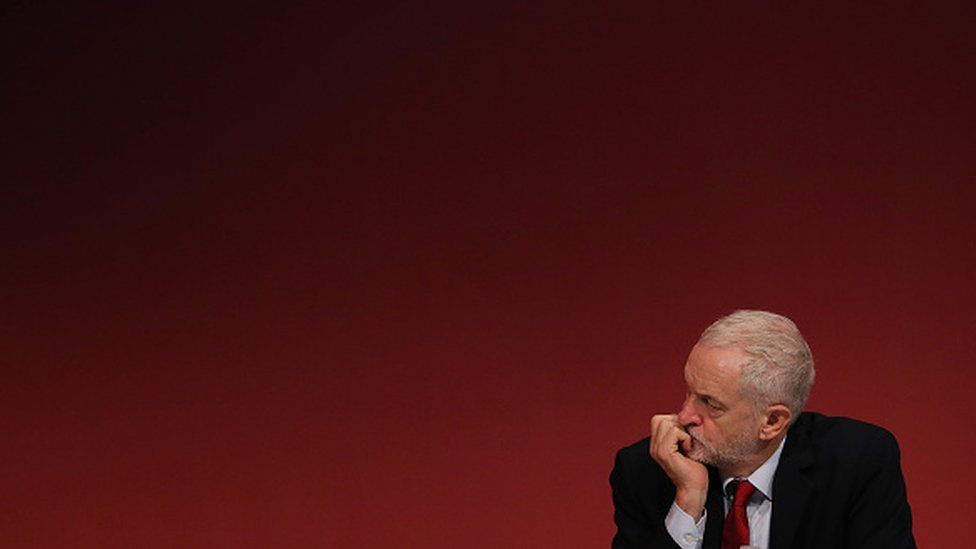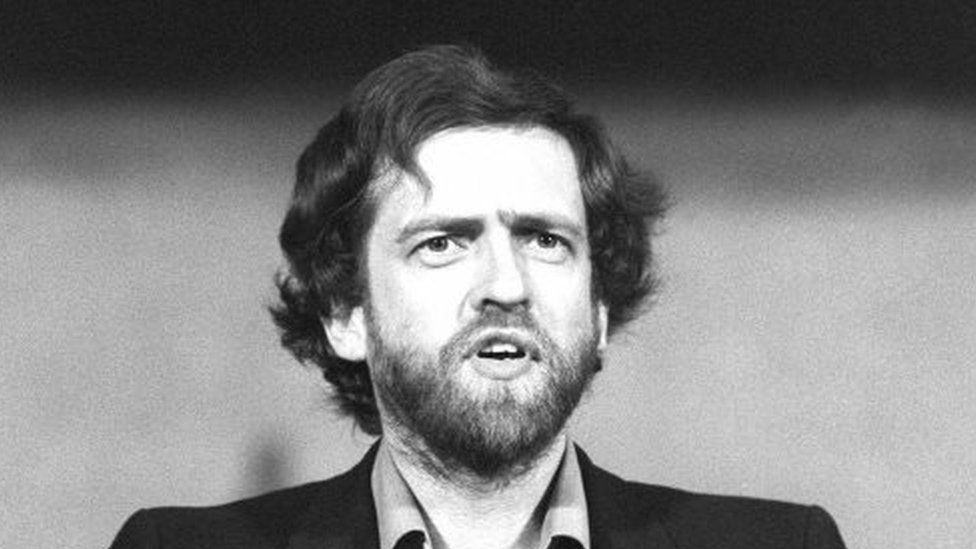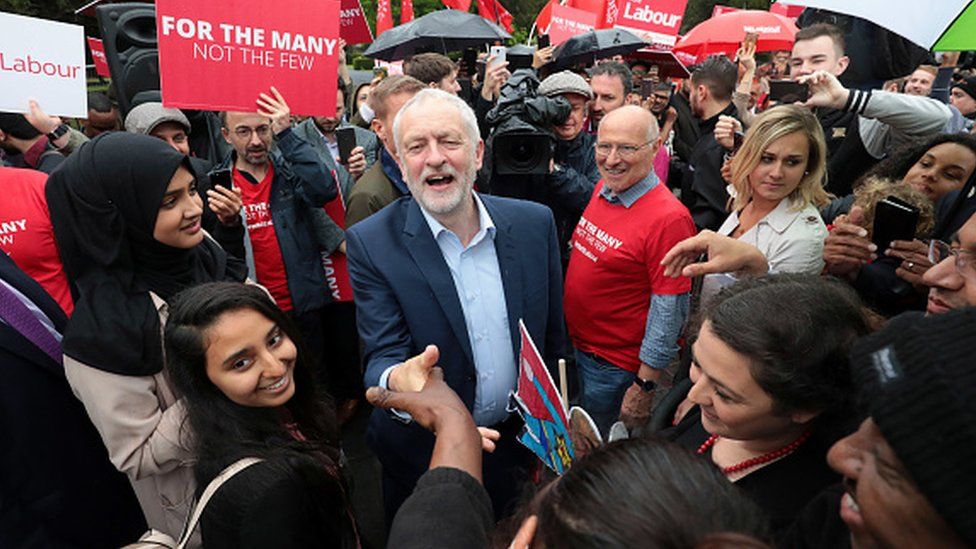"Blocking Jeremy Corbyn from standing as a Labour candidate is an affront to decency and a declaration of civil war within a party about to metamorphose from a broad church to a toxic sect," said Yanis Varoufakis.

Jeremy Corbyn, a member of U.K. Parliament for Islington North, prepares to address anti-war demonstrators on February 25 2023 in London.
(Photo: Mark Kerrison/In Pictures via Getty Images)
Mar 28, 2023
Former U.K. Labour Leader Jeremy Corbyn is expected to seek reelection as an independent next year after current Leader Keir Starmer and his establishment allies on Tuesday made good on their pledge to formally block the leftist member of Parliament from running under the party's banner.
After Starmer publicly declared last month that "Jeremy Corbyn will not stand as a Labour candidate at the next general election," the party's National Executive Committee (NEC) voted 22-12 on Starmer's motion to not endorse Corbyn's candidacy.
The Timesreported that Corbyn's allies say the MP has already decided to run as an independent, with one source telling the London newspaper: "It's become personal. There will be an announcement by the end of the week."
Our message is clear: We are not going anywhere. Neither is our determination to stand up for a better world.
Corbyn has represented the Greater London constituency Islington North for four decades and served as an independent MP since he was suspended from Labour in 2020 due to a battle over allegations of antisemitism in the party.
After news broke of Starmer's motion on Monday, Corbyn charged that the party leader "has broken his commitment to respect the rights of Labour members and denigrated the democratic foundation of the party."
Noting that Islington North voters have elected him as a Labour MP 10 consecutive times since 1983, Corbyn said that "I am proud to represent a community that supports vulnerable people, joins workers on the picket line, and fights for transformative change."
Also calling out the ruling Conservative Party, Corbyn continued:
This latest move represents a leadership increasingly unwilling to offer solutions that meet the scale of the crises facing us all. As the government plunges millions into poverty and demonizes refugees, Keir Starmer has focused his opposition on those demanding a more progressive and humane alternative.
I joined the Labour Party when I was 16 years old because, like millions of others, I believed in a redistribution of wealth and power. Our message is clear: We are not going anywhere. Neither is our determination to stand up for a better world.
Some other MPs, constituents, journalists, and leftists from around the world have, since Monday, blasted Starmer's "disgraceful" move and expressed solidarity with Corbyn.
Greek leftist MP Yanis Varoufakis warned that "Starmer's Labour Party is close to the point of no return. Blocking Jeremy Corbyn from standing as a Labour candidate is an affront to decency and a declaration of civil war within a party about to metamorphose from a broad church to a toxic sect."
Critics have highlighted that in February 2020, Starmer said: "The selections for Labour candidates needs to be more democratic and we should end NEC impositions of candidates. Local party members should select their candidates for every election."
In a joint statement Tuesday, officers from the Islington North Constituency Labour Party (CLP) denounced the move by Starmer and the NEC.
"We believe in the democratic right of all constituency parties to choose their prospective parliamentary candidate," the CLP leaders from Corbyn's area said. "Therefore, we reject the NEC's undue interference in Islington North, which undermines our goal of defeating the Conservatives and working with our communities for social justice."
Noting the CLP's statement in a series of tweets Tuesday, Guardian columnist Owen Jones, who identifies as a socialist and a longtime Labour voter, also took aim at Starmer:
While Starmer was seeking his leadership role, "I think he said a lot of things he didn't believe at all, because he thought that if he didn't, then he wouldn't be elected leader of the Labour Party. And he was absolutely right in that calculation," Jones asserted.
"A lot of Starmer's cheerleaders see themselves as upstanding liberals who believe in decency, honesty, and integrity in politics. They don't," he said. "They disregard the colossal deceit of Starmer because they hate the left, and they believe anything done to crush the left is a good thing."
"Anyway, I don't think it will end well for a Labour leadership which is founded on a load of lies, essentially believes in nothing, and is ahead in the polls solely because of Tory self-destruction," Jones added. "They'll win the election by default, then political reality will intrude."
The grassroots group Momentum, which has supported Corbyn since his successful 2015 campaign to lead the Labour Party, called Tuesday "a dark day for democracy."
While there was previously no appeals process for anyone blocked by the NEC, Sky Newsrevealed Tuesday as the party faces "accusations of fixing parliamentary selections for candidates who are preferred by the leadership," those "who wish to stand for Labour at the next election will be given the right to appeal if the party rejects their bid to become an MP."
According to the outlet, "Candidates will be provided with written feedback as to why they 'fell below the standards expected of a Westminster parliamentary candidate,' while an appeals panel will be convened to hear the claim."
Welcoming the development on Twitter, Momentum said that "socialists and trade unionists have been wrongly excluded in favor of those favored by a narrow London clique. The result has been a cohort of prospective MPs dominated by the professional political classes, making Labour less representative of the communities we seek to serve."
"This new process should mark an end to the Labour right's factional abuses of selections process," the group added. "In Islington North as everywhere else—let local members decide."
Ex-Labour leader says he has ‘no intention of stopping the fight’ as Keir Starmer faces fierce criticism from left
Aletha Adu
Jeremy Corbyn has given his strongest hint yet that he will stand as an independent candidate, saying he has “no intention of stopping the fight” to represent his north London constituents.
The former party leader was on Tuesday formally blocked from standing for Labour at the next election, prompting leftwingers to fiercely criticise Keir Starmer’s “authoritarian” and “divisive” move.
Corbyn is unable to put himself forward for selection in his Islington North constituency Labour party (CLP), where he still has a solid support base, because the party’s national executive committee (NEC) signs off on all candidate lists.
He released a statement hours after the NEC backed Starmer’s motion to block him from standing as a party candidate, with 22 votes to 12.
“The NEC’s decision to block my candidacy for Islington North is a shameful attack on party democracy, party members and natural justice,” Corbyn said. “Now, more than ever, we should be offering a bold alternative to the government’s programme of poverty, division and repression. Keir Starmer has instead launched an assault on the rights of his own Labour members, breaking his pledge to build a united and democratic party that advances social, economic and climate justice.
“I will not be intimidated into silence. I have spent my life fighting for a fairer society on behalf of the people of Islington North, and I have no intention of stopping now.”
The Momentum founder, Jon Lansman, who was once one of Corbyn’s closest allies, said Starmer was “behaving like some kind of Putin of the Labour party” who had failed to fulfil his leadership promise of ending factionalism.
Corbyn was suspended from Labour in October 2020 for suggesting complaints of antisemitism had been “dramatically overstated” for political reasons. His membership was later reinstated but Starmer refused to restore the party whip, meaning he sits as an independent MP.
The NEC motion did not explicitly mention the issue of antisemitism. Instead, it said Labour’s electoral prospects in the seats it needed to win at the next election would be “significantly diminished” should Corbyn be a Labour candidate.
“We’ve got to recognise that the radical policies that we had under Jeremy Corbyn … were not the problem,” Lansman told Times Radio. “The party still supports them. I think we should be campaigning still for radical policy … We have to demand. We’re a democratic party. This is not an authoritarian party. Keir Starmer unfortunately is behaving as if he was some kind of Putin of the Labour party. That is not the way we do politics.”
The Islington North CLP has publicly rejected Starmer’s move to block Corbyn, saying north London voters “deserve a free and fair vote on who gets to represent them”. Many leftwing MPs have resorted to sharing the CLP’s statement, instead of outrightly condemning Starmer’s leadership.
A large number of leftwingers believe there is little point in “incriminating themselves” on broadcast media if they want to stay in the Labour party. “We’re not scared, but who wants to follow Corbyn out the door? We have constituents to represent here in parliament,” one leftwing MP said.skip past newsletter promotion
Corbyn’s allies told the Guardian last month he was likely to run as an independent, with one friend saying he would do so once all the routes to the Labour nomination had been exhausted.
The former shadow chancellor John McDonnell said: “With [an] election in 18 months we need a united party to win a Labour government. This decision will be seen as divisive and brutal, victimising someone who has given his life to our movement. We need a campaign in CLPs and affiliates to reverse this decision.”
Nadia Whittome, the MP for Nottingham East, added: “It should be up to local members in Islington North to decide who represents them. The motion to ban Jeremy Corbyn from restanding is divisive, an attack on party democracy and a distraction from the vital task of getting the Tories out. I hope it’s withdrawn or rejected.”
Momentum called the decision an “anti-democratic stitch-up” and said Starmer had expressed support for the local membership selecting their candidates “for every election” while he was running to become Labour leader.
Jeremy Corbyn: The left-wing veteran outcast by his party
 GETTY IMAGES
GETTY IMAGESA Labour member since his teenage years, Jeremy Corbyn has been a devotee to the party he led through one of the most turbulent periods in British political history.
But he is now facing the end of his long political marriage with the Labour Party.
His successor, Sir Keir Starmer, has told him he will not be a Labour candidate at the next election.
Now Labour's governing body has voted to approve a proposal to officially ban Mr Corbyn from standing for Labour.
The decision had been hanging over Mr Corbyn since he was suspended as a Labour MP in a row over antisemitism.
His political future now hangs in the balance as he considers whether to stand against Labour as an independent candidate in his Islington North constituency.
Whatever he decides, Mr Corbyn has already left an indelible mark on British politics.
A fixture on the left-wing political scene for more than four decades, Mr Corbyn was schooled in radicalism by his parents, who met as activists in London during the Spanish Civil War.
He grew up in Shropshire and became politically active early on in his life, joining Labour and the Campaign for Nuclear Disarmament (CND) while at school in the 1960s.
A stint as a trade union official and a councillor in London followed in the 1970s, before he was elected MP for the Labour stronghold of Islington in 1983.
Through the 1980s and subsequent decades, he devoted himself to various socialist causes, railing against the policies of the Thatcher, Major and Blair governments from the backbenches.
A committed pacifist, Mr Corbyn was a thorn in the side of former Labour Prime Minister Tony Blair, repeatedly rebelling against his government, most notably over the Iraq War.
At that point, few would have predicted Mr Corbyn's rise to Labour's top job.
 PA
PAMr Corbyn's election in September 2015 as Labour leader, at the age of 66, counted as one of the biggest upsets in British political history.
It heralded a remarkable revival in fortunes for a brand of left-wing politics that Mr Blair made a point of departing from under the New Labour banner.
His unvarnished and unabashed commitment to socialism - that made him an irrelevant throwback in the eyes of his critics - struck a powerful chord with many Labour activists.
According to research conducted by the British Election Study after each election, Labour's vote share rose by more than 20% among 18 to 25-year-olds between 2015 and 2017 but actually fell among voters aged 66 and over.
The high watermark of Corbynism came at the 2017 year's general election, which saw Labour exceed all expectations by winning 40% of votes nationally.
Even though it was a loss, Mr Corbyn deprived the prime minister at the time - Theresa May - of her majority.
A crowd of tens of thousands at that year's Glastonbury Festival chanted "Oh Jeremy Corbyn", as the Labour leader took to the stage.
The enthusiasm he generated among his supporters was not enough to win Labour the next election in 2019, though.
With Parliament in deadlock over Brexit, former Prime Minister Boris Johnson won a landslide victory, sweeping aside Labour strongholds across northern England, the Midlands and Wales in areas which backed leaving the EU in the 2016 referendum.
Mr Corbyn stood down as leader, saying Brexit had "polarised and divided debate in this country".
 GETTY IMAGES
GETTY IMAGESUnder his leadership, Labour had been plagued by allegations of anti-Jewish racism by some of its supporters. Recriminations over how complaints about these allegations were handled by the party continued once Mr Corbyn had quit as leader.
In October 2020, a report by the Equality and Human Rights Commission's found Labour to have been responsible for "unlawful" acts of harassment and discrimination during Mr Corbyn's four-and a-half years as party leader.
Its investigation identified serious failings in leadership and an inadequate process of handling antisemitism complaints.
Mr Corbyn said the scale of antisemitism within Labour had been "dramatically overstated" by his opponents and that he had always been "determined to eliminate all forms of racism".
He was suspended from the party and was readmitted a month later.
But Mr Corbyn was not readmitted to Labour's parliamentary party and continues to sit in the House of Commons as an independent MP.
Labour, under Sir Keir's leadership, pledged to rid party of antisemitism and the Equality and Human Rights Commission said last month it was satisfied that enough changes had now been made.
As Labour turns the page on project Corbyn, its chief architect has returned to a position of familiarity on the margins of politics.
A rank outsider, Mr Corbyn will need to beat the odds yet again to add new chapters to his colourful political career.
No comments:
Post a Comment